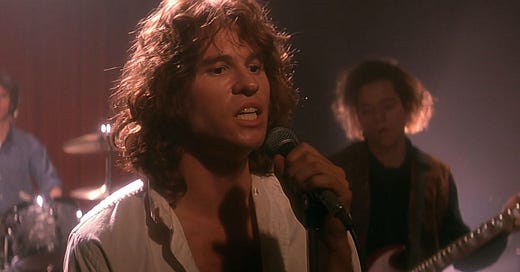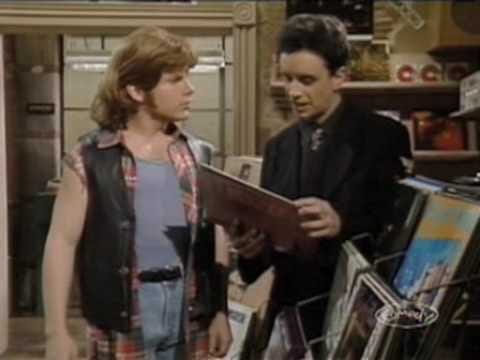Swan Songs & Sour Notes: The Doors
Val Kilmer would want me to acknowledge his passing with some nonsense.
(This is Swan Songs & Sour Notes, an occasional feature in which I discuss the good, the bad, and the oh good lord in musician biopics.)
Folks, I can trust you, right? We’re all friends here? I can confess something and you won’t think badly of me?
Okay. Here goes. Confession is good for the soul.
I went through a Doors phase.
I know, some sins can’t be forgiven, but just let me get this off my chest. I was young and stupid, and in desperate need of guidance. Instead, I had my father’s music collection, which consisted of a lot of freeform jazz, Talking Heads (now one of my favorite bands), Pink Floyd (which I still listen to occasionally), and well, The Doors. I knew who they were by then, of course, but hadn’t heard much beyond “Light My Fire,” which was already a staple of the local classic rock radio station. More importantly, I also knew who Jim Morrison was, the foxy dude who sultrily stared out of many a poster sold at Spencer’s Gifts.
I was captured immediately by his faux-Beat Generation blathering. You see, I also thought I was a poet, writing embarrassing nonsense about things I didn’t even really understand yet, like unrequited love and human mortality. I’d listen to Jim Morrison blarble about wanting to kill his father and fuck his mother1 and think this is some deep shit, man, while trying to do my math homework at the same time. Like a lot of Doors fans, I was convinced that I understood Jim at a deeper level than other people, and even developed a crush on him. This would be the first of several famous drunk (and mostly dead) artists I would crush on (see also: Jack Kerouac) even though they were reportedly awful to their friends and lovers; thankfully, with one or two exceptions, this never bore itself out in real life.
ANYWAY, The Doors came out in 1991, when my Doors phase was at its peak, so much so that I even bought Jim Morrison’s poetry book. I needed an intervention, and instead, I managed to talk a friend into going to see Oliver Stone’s curiously contradictive biopic on opening weekend.
Oh sure, it’s called The Doors, but so little time is expended on Ray Manzarek, Robby Krieger, and John Densmore (the members who actually played instruments) that Stone might as well have called it Jim Morrison (and Some Other Guys Who Gives a Shit). If not for the fact that they’re all played by recognizable actors (Kyle MacLachlan as Manzarek, Frank Whaley wearing a cotton candy wig as Krieger, Kevin Dillon as Densmore), you wouldn’t even notice them, because they do little more than stand in the background and frown at Jim’s antics.
Stone makes it abundantly clear that Jim Morrison is the only Door worth opening, as it were. He’s front and center here, a larger-than-life persona captured in a way that’s somehow both worshipful and damning at the same time. Jim may have been a poet and a singer, but as far as the movie is concerned, his most important legacy was being a sexy asshole, who drank and fucked and threw tantrums with abandon, because he was obsessed with death or some shit.
The Doors spent more than a decade in development, with every director from Francis Ford Coppola to Martin Scorsese to Brian De Palma attached to it at some point, and every actor from John Travolta to Richard Gere to Tom Cruise (lol could you imagine) considered to star in it. It ended up going to Oliver Stone, following the hat trick of Platoon, Wall Street, and Born on the Fourth of July between 1986 and 1989. By all accounts, it was a cursed production, with Ray Manzarek refusing to participate (he was understandably put off by how much of the story focused solely on Morrison), and both Morrison’s family and the family of his late girlfriend Pamela Courson demanding strict limitations on how they were portrayed. Not letting a little thing like having to resort to lying to get his biopic made stop him, Stone pressed forward.
When we could have had Tom Cruise as Jim Morrison (seriously what), instead we got his Top Gun co-star Val Kilmer instead, and thank God for that. As is well-known by now, Kilmer did everything up to digging up Morrison’s corpse and wearing his skin to prepare for the role, spending hundreds of hours with Morrison’s friends and colleagues (except Ray Manzarek, presumably), and learning to sing over 50 Doors songs, which was undoubtedly more challenging than learning to sing “Skeet Surfin’” for Top Secret!
Kilmer’s hard work paid off: he looked and sounded remarkably like Jim Morrison, with virtually no additional bells and whistles save for a perm and some strategically fitted leather pants. He was that Spencer’s Gifts poster come to glorious life, and absolutely committed to playing a sexy asshole. I say in all seriousness, it’s one of his best performances, regrettably expended on a movie that’s less a biopic and more a concept of a biopic.
You know you’re in for some premium gah-bage when The Doors opens with a flashback of a young Jim and his family driving down a desert highway and encountering a group of Native Americans who have just been in a car accident. An elderly Native man who appears to be drawing his last breath stares meaningfully at Jim as he passes by, and there’s a strong suggestion going forward that his spirit enters this Caucasian child, or at least, becomes his guide, perhaps as penance for some unspecified sin, maybe cheating on his taxes or coveting his neighbor’s wife.
ANYWAY, I won’t do a beat-by-beat recounting of the plot, because it’s pretty much just that. The Doors both checks off all the cliches of the “tortured artist” biopic (meteoric rise to fame, troubled personal life, spiral into addiction, inglorious fall), while also trying to say something about the 60s in general, which even by 1991 was already an exhausted subject (particularly by Oliver Stone). Here, Jim Morrison isn’t a person so much as a symbol, Dionysus leading the American youth away from the square and hypocritical values of their parents, who are all too happy to send them off to die overseas.
Stone was so disinterested in the reality of Jim Morrison that he ended up making up a lot of shit about him, much of which made him look worse than he actually was. Artistic liberties were taken, so much so that the “historical inaccuracies” section on the Wikipedia page for The Doors is a whopping nine paragraphs long. Much of it related to Morrison’s relationship with his longtime girlfriend Pamela Courson (played here as the world’s most wholesome heroin addict by a wildly miscast Meg Ryan), evidently more stable than what’s portrayed on screen, which is mostly a lot of screaming and crying and stomping on Thanksgiving turkeys.
Stone also elected to depict Morrison as dour and self-serious2, when by all accounts he had a witty sense of humor, and was even known to smile on occasion. Further, there was no evidence that he ever received a gold telephone from Andy Warhol that would allow him to talk to God3. Most importantly, there was no real life equivalent of Billy Idol’s character Cat, who’s there mostly because he visited the set one day and said “Oi, Oliver, gimme a role in yer bleedin’ movie” (I am quite certain this is how British people talk).
Clocking in at a hefty 140 minutes (while still only covering six years), The Doors is remarkable in that the audience comes away from it learning nothing about Jim Morrison other than what was already established: alcoholic, troubled artist, got arrested for taking his dick out on stage, died young. It’s not even the Cliffs Notes version of his life, it’s information you could have found in a Rolling Stone blurb.
But, again, Val Kilmer takes this thin soup and turns it into a hearty beef4 stew. He’s committed and charismatic, a believable Jim Morrison for a movie that treats him as an embodiment of artistic excess and not much else. The Doors started me on the road to recovering from my Doors phase, but Kilmer strung me along a little longer. He understood what made Jim Morrison an interesting figure even long after death, even if Oliver Stone didn’t.
I will concede that Francis Ford Coppola’s iconic use of “The End” at the beginning of Apocalypse Now is one of the finest moments in 70s film.
Though this is true of every protagonist in an Oliver Stone film.
I will say, however, that Crispin Glover, wearing a false nose and a fright wig as Warhol, is the second best performance in The Doors after Val Kilmer, and if the plot was the two of them on a road trip together, it would have been the greatest movie of all time.
Emphasis on “beef.” I’m trying to say he looked really good in those leather pants.






I also went through a doors phase and I loved this movie when it came out. I also loved No One Here Gets Out Alive which depicts Morrison as a raging assole (who is also funny).
I remember seeing the movie and feeling high afterwards. So much that I tried to make eye contact with passing motorists.
I was a little stupid.
https://open.substack.com/pub/marlowe1/p/sweet-my-name-is-on-the-cover?utm_source=share&utm_medium=android&r=sllf3